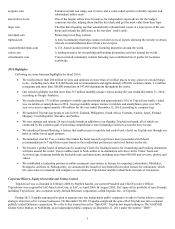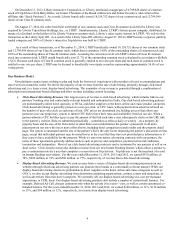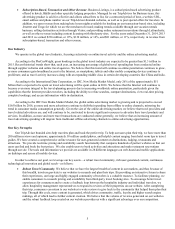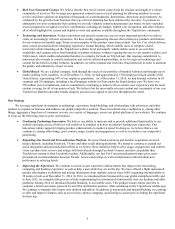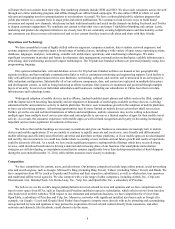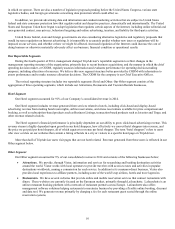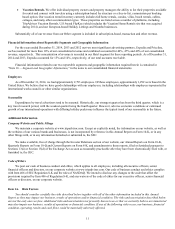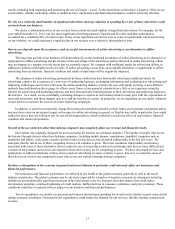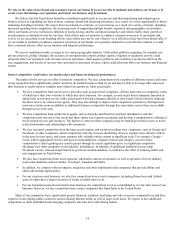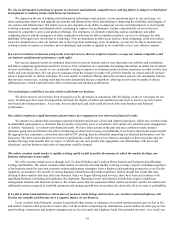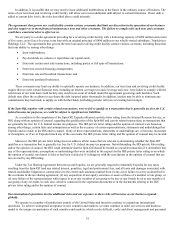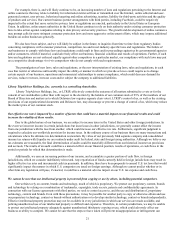TripAdvisor 2014 Annual Report Download - page 23
Download and view the complete annual report
Please find page 23 of the 2014 TripAdvisor annual report below. You can navigate through the pages in the report by either clicking on the pages listed below, or by using the keyword search tool below to find specific information within the annual report.13
results, including both expanding and promoting the use of Google + Local. To the extent these actions have a negative effect on our
search traffic, whether on desktop, tablet or mobile devices, our business and financial performance could be adversely affected.
We rely on a relatively small number of significant advertisers and any reduction in spending by or loss of those advertisers could
seriously harm our business.
We derive a substantial portion of our revenue from a relatively small number of significant advertisers. For example, for the
year ended December 31, 2014, our two most significant advertising partners, Expedia and Priceline (and their subsidiaries),
accounted for a combined 46% of total revenue. If any of our significant advertisers were to cease or significantly curtail advertising
on our websites, we could experience a rapid decline in our revenue over a relatively short period of time.
Our success depends upon the acceptance, and successful measurement, of online advertising as an alternative to offline
advertising.
The long-term growth of our business will depend heavily on the continued acceptance of online advertising as an alternative or
supplement to offline advertising and the increase in the percentage of the advertising market allocated to online advertising, which
may not happen in a manner or to the extent that we currently expect. We compete with traditional media for advertising dollars, in
addition to websites with higher levels of traffic. If online advertising ceases to be an acceptable alternative or supplement to offline
advertising then our business, financial condition and results of operations will be negatively impacted.
The adoption of online advertising, particularly by those entities that have historically relied upon traditional media for
advertising, requires the acceptance of a new way of conducting business, exchanging information and evaluating new advertising and
marketing technologies and services. Because the online marketing industry is relatively new and rapidly evolving, it uses different
methods than traditional media to gauge its effectiveness. Some of our potential customers have little or no experience using the
Internet for advertising and marketing purposes and have allocated only limited portions of their advertising and marketing budgets to
the Internet. As a result, we are continually evaluating changes to aspects of our business model to keep pace with the expectations of
users and advertisers, and these changes may not yield the benefits we expect. In particular, we are dependent on our clients’ adoption
of new metrics to measure the success of online marketing campaigns.
In addition, if advertisers materially change their transaction attribution models or their return on investment calculations and/or
increase their return on investment targets with respect to online advertising in general, or TripAdvisor traffic in particular, they might
reduce the prices they are willing to pay for our advertising products, which would have an adverse effect on our business, financial
condition and results of operations.
Growth in the use of devices other than desktop computers may negatively affect our revenue and financial results.
Our content was originally designed for users accessing the Internet on a desktop computer. The number of people who access
the Internet through devices other than desktops computers, including mobile phones, smartphones, handheld computers such as
notebooks and tablets, video game consoles and television set-top devices, has increased substantially in the last few years. We
anticipate that the rate of use of these computing devices will continue to grow. The lower resolution, functionality and memory
associated with some of these alternative devices make the use of our products and services through such devices more difficult and
versions of our products and services developed for these devices may not be compelling to users. We have developed services and
applications to address limitations of these devices and our advertising revenues continue to grow, however, we monetize users of
these devices at a lower rate compared to users who access our websites through desktop computers.
Declines or disruptions in the economy in general and travel industry in particular could adversely affect our businesses and
financial performance.
Our businesses and financial performance are affected by the health of the global economy generally as well as the travel
industry in particular. The global economy may be adversely impacted by a number of negative economic developments including
defaults on government debt, significant increases in fuel and energy costs, tax increases and other matters that could reduce
discretionary spending, continued tightening of credit markets, further declines in consumer confidence, and policy missteps. These
conditions could have a material adverse impact on our business and financial performance.
Travel expenditures are sensitive to personal and business discretionary spending levels and tend to decline or grow more slowly
during economic downturns. Decreased travel expenditures could reduce the demand for our services, thereby causing a reduction in
revenue.


